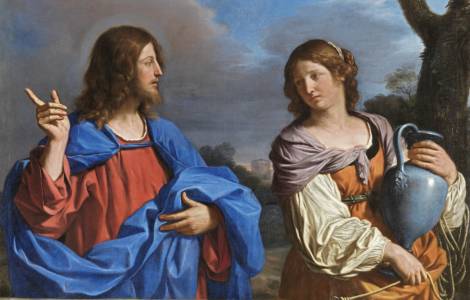
Vatican City (Agenzia Fides) – "To go and proclaim the Gospel, we first need to set down the burden of our history at the feet of the Lord, to consign to Him the weight of our past. Only reconciled people can bring the Gospel." This is what can be read in the text of the catechesis of the general audience that the Pope, back in the Vatican three days ago after more than a month of hospitalization for bilateral pneumonia, was due to deliver today.
Continuing the cycle of catecheses dedicated to the life of Jesus, read in light of the theme of the Jubilee, the Pontiff continues his analysis of the encounters Jesus took place along the way, focusing today on the encounter with the Samaritan woman at the well. This, the Pope emphasizes, is one of those moments "in which it seems that He is in fact waiting right there, at that crossroads in our life. They are encounters that surprise us, and at the beginning we are perhaps even a little diffident; we try to be prudent and to understand what is happening," as happened with the Samaritan woman.
She, the Bishop of Rome emphasizes, "did not expect to find a man at the well at noon; indeed she hoped to find no one at all. In Perhaps this woman is ashamed of her life, perhaps she has felt judged, condemned, not understood, and for this reason she has isolated herself, she has broken off relations with everyone." At the same time, Jesus, who "could have chosen another road and not pass through Samaria," and "it would also have been safer, given the tense relations between the Jews and the Samaritans. Instead, He wants to pass through there, and stops at that very well, right at that time! Jesus waits for us and lets Himself be found precisely when we think that there is no hope left for us."
The place of the encounter is also significant: "The well, in the ancient Middle East, is a place of encounter, where at times marriages are arranged; it is a place of betrothal. Jesus wants to help this woman understand where to find the true answer to her desire to be loved."
And "if Nicodemus had gone to Jesus at night, here Jesus meets the Samaritan woman at midday" because "it is the time when there is most light. It is indeed a moment of revelation. Jesus makes Himself known to her as the Messiah and also sheds light on His life." "When she realizes that Jesus knows her life, the woman shifts the conversion to the religious question that divided Jews and Samaritans. This happens sometimes to us too when we pray: at the moment in which God is touching our life, with its problems, we lose ourselves at times in reflections that give us the illusion of a successful prayer. In reality, we have raised barriers of protection. However, the Lord is always greater, and to that Samaritan woman, to whom according to cultural precepts He should not even have spoken, He gives the highest revelation: He speaks to her of the Father, who is to be adored in spirit and truth. And when she, once again surprised, observes that on these things it is better to wait for the Messiah, He tells her: “I am he, the one who is speaking with you” (v. 26). It is like a declaration of love: the One you are waiting for is Me; the One who can finally respond to your desire to be loved."
At that point "the woman runs to call the people of the village, because mission springs precisely from the experience of feeling loved. And what proclamation could she have brought, if not her experience of being understood, welcomed, forgiven? It is an image that should make us reflect on our search for new ways to evangelize". For her, "the past is no longer a burden; she is reconciled. And it is like this for us too", the Pope concludes. (F.B.) (Agenzia Fides, 26/3/2025)